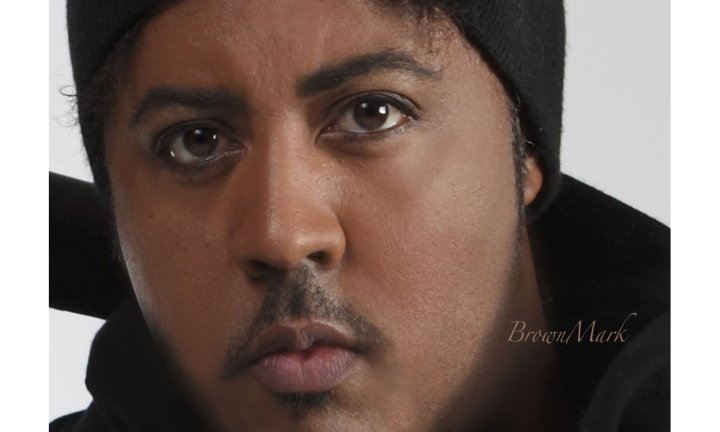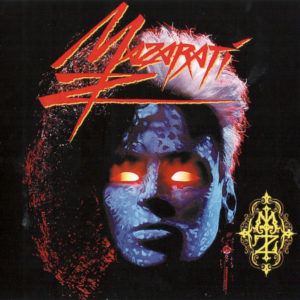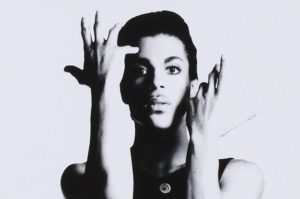
Interview: BrownMark – Kiss And Tell
Many people don’t know the full story of Prince, BrownMark, and the side project known as Mazarati. Mazarati‘s involvement in some of Prince‘s songs is legendary lore. Funkatopia’s Mr. Christopher sat down with Revolution bassist BrownMark to capture Mark’s side of the story on how he co-wrote Kiss, what he learned from Prince, and how he’ll keep putting bass in yo face.
Mr. Christopher: I really want to talk with you about your journey. You’re one interesting cat, because you’ve been there through all the thick and thin of it. You sat quietly in the background and took it all in. Was that intentional on your part as a personal decision to stay out of the limelight, or did Prince feel as if you needed to sit back?
BrownMark: Well, you know, I talk a lot about my mother and her influence in my life because I grew up fatherless and basically grew up on the street because she worked all of the time. Her advice meant everything to me and one the things she always taught me is that when you don’t understand something, you shut your mouth and you absorb like a sponge, soak it all in and sort through it. And so, that’s the philosophy that I developed as a child.
And so, when I got in a band with Prince, you know, I could be loud and arrogant and fight with him tooth and nail with every step that I took or every time that I didn’t like something or I could just soak it all in and try to figure out why is it this way and why is it that way. And that was the path that I chose. So it was intentional. Very deliberate. And I learned a lot from it because there was a lot that I didn’t know like Prince and Morris, Jimmy Jam and Terry and all of them.
 They had been in the business long before they had made it. Me, I basically started when I was like 14 or 15 years old, but it was more of a hustle. I was just a bass player and I played in a band and it was just, you know, a hustle. I didn’t know a lot about the music business. So I went to school. I went to college. I call it the Prince College of Music. And I shut my mouth and I let him teach me how it’s done.
They had been in the business long before they had made it. Me, I basically started when I was like 14 or 15 years old, but it was more of a hustle. I was just a bass player and I played in a band and it was just, you know, a hustle. I didn’t know a lot about the music business. So I went to school. I went to college. I call it the Prince College of Music. And I shut my mouth and I let him teach me how it’s done.
Then it got to a point where I wanted to branch out on my own, as you know, I believe it was 1986. He didn’t want me to go and he begged me to stay and I just looked at him and I said to him, “I think my time is done here.” And he said, “Why?” and I said, “You’ve got me behind a piano and you’ve put 3 guys in front of me and if that’s not a sign, then what is?” That was my time to exit.
He wanted me to play in the NPG with Sheila E. on drums and it was going to be Levi on guitar and I just…I just didn’t want to do it anymore. It just got to a point where I had to start blazing my own trail. So that’s what happened. So yeah, it was intentional.
Mr. Christopher::You came in during the Controversy album and some of your earlier shows when you were opening up for The Rolling Stones. We’ve all heard the stories about him being booed off of the stage, but what exactly was that like? What did it feel like to be booed at that level?
BrownMark: Well, you can’t change the story. People are going to believe what they believe, but we didn’t really get booed off of the stage. That’s the real truth. In fact, they booed The Rolling Stones. Mick Jagger walked out and they booed him too. I think it was just the nature of that audience. The kind of energy that was brewing in that crowd. It was hot. They were all piled in like cattle and it was like 90 something thousand people. You know, so it was just the atmosphere. The frustration and the irritation in the air. And people just came to hear who they wanted to hear.
All of a sudden we show up on stage and it was like, who are these guys? It went well until we got, usually into it about 4 songs and then they started to get rowdy because enough’s enough. We hear what you’re doing, some of us like it, some of us don’t, you know, get the hell off the stage (laughs). That’s the kind of atmosphere it was. Fights, etc.
Mr. Christopher: Speaking of which, we always heard a lot about the practical jokes like Jesse Johnson being handcuffed backstage (laughs) and all the craziness that was going on back when The Time came into the picture. Were there any practical jokes going on back then that you remember or one of the stories that you always tell when you’re sitting around with the guys?
BrownMark: You probably heard most of them. There’s really hundreds of stories. The one about Jesse Johnson being handcuffed was a very funny time period because we actually destroyed the arena that we played in. It cost Prince thousands of dollars in damages.
The food fight was so extensive and we tore up everything. But yeah, it was a very funny relationship between The Revolution and The Time. When the movie came out [Purple Rain], that camaraderie that existed between the bands was real. It actually existed. But it was a little worse than what the movie depicted. But it was fun.
There wasn’t any ill intent. It was just that we were always at odds with each other. So whenever we would hit the stage or even leave the stage, there was always drama. And I remember that fight. It was just amazing. We were planning things like, “Ok, tomorrow we’re going to order 25 pies.(laughs) from catering and we’re going to do this.” It was like we were sitting at a round table at a military command post strategically setting up our next plan of attack. It was crazy. It was a pretty fun time period…yeah.
Mr. Christopher: I know that you were involved in Mazarati. And I actually have a couple of questions about this because many are aware of your solo projects with Cryptic and Syx mil Breach, but during the 80’s when Prince was pretty much at the top of his game, and he’s giving out all of these amazing songs to The Family, The Time, etc But you’ve got a band like Mazarati who is fantastic, and while you did get a lot of traction with 100 MPH, but…Kiss is a good example. A song like that where he would give it to Mazarati, you would make it your own, and then he would say, “You know what? I kind of like that, I’m taking it back.”. [Brownmark; “yeah, yeah, yeah.”]
Was there any animosity there? Did you guys sit back as a band and take offense to it? Are feelings getting hurt or do you feel like you were being slighted? What was going on then?
BrownMark: That’s an interesting story and I’ve heard it in a lot of different versions from people, but here’s the real truth. I was never a songwriter when I worked with Prince. I would watch him and I was learning. So I formed this group and I kept them out of sight for years. I formed them in 1982. And I worked them into the local chitlin’ circuit, as I call it, where it’s the small bars and the local area in order to groom them and to build them into what I needed them to be.
I lived vicariously through them because I always wanted to be a rocker and in Prince’s band I was something totally different. So I developed this group to be what I wanted them to be. Then Prince found out that I had them because their following was getting huge and he asked that I put them on Paisley Park and this is a few years later. And I said I would, but only out of loyalty to him, but I always felt the whole time, like he wanted to…just take them from me. And I kind of knew that’s what it was. But, I was smart enough to know how to avoid that.
 100 MPH was definitely their biggest hit because he was at the top of his game and he was a seasoned writer, so we needed him for that and he really helped us out in getting that boost. But this one Prince show that they did, when they walked out on the stage in front of what must have been 17,000-20,000 people, the crowd went off. They loved Mazarati. And I don’t think that sat well with him, because right after that, they were done. He just took them off the tour and they just disappeared.
100 MPH was definitely their biggest hit because he was at the top of his game and he was a seasoned writer, so we needed him for that and he really helped us out in getting that boost. But this one Prince show that they did, when they walked out on the stage in front of what must have been 17,000-20,000 people, the crowd went off. They loved Mazarati. And I don’t think that sat well with him, because right after that, they were done. He just took them off the tour and they just disappeared.
So, everything I thought about this group in regards to Prince started to become a reality. I feel like he wanted to dismantle them. Either wanted to take them over or if he couldn’t accomplish that, then he needed to dismantle them. And I really felt like that’s what he was doing when Kiss came into the picture. That’s when I first started to see it.
He gave me a cassette tape and there was nothing on it other than a guitar riff, or a blues riff that I found that was a 1929 version of it. Same thing. Exact same thing. [hums the straight guitar chord progression] and then he just started singing the lyrics slowly [“U don’t have to be beautiful”] and that’s how he sang it and he said, “I want you to put that on the album.” [The Mazarati debut album].
I was like, it’s totally opposite of everything that we’re doing. Why would I put that on the record? And we had an argument about it. So I said OK. But I’m going into the studio and I’m going to put some ‘Brown Stank’ on it. (laughs) and I don’t know if you’ve heard the Mazarati version or not?
Mr. Christopher: Oh yes. I have.
BrownMark: So, yeah, it’s basically the song Kiss that we hear today, but of course, I had the DX drum machine, and he had the Linn drum machine, so he took the DX off of it and replaced it with the Linn sound. Made a couple other changes. He added a guitar part.
But how this came about is that we were going to dinner and he said, “Let me do some work on it and when you come back from dinner, I’ll let you hear it and see if you like what I did to it.” Well, we came back from dinner about 4 hours later. He not only did the change, but he took the bass out, he put a guitar riff in there, but he also put his voice on it. He started singing the song and he left Mazarati’s background vocals on it.
Then he says, “This song will be better if we produce it for me.” And I was like, “We?..So you’re saying that you’re going to let me have production on your album? As a producer?” And he said, “Yes.”, so I was like, “Ok. Let’s do it.” Because I didn’t want it on Mazarati’s album anyway because it was so different from what they were doing.
Where it got getting really sore for everybody is because we never got paid for it. We never got royalties for it. We never even received credits for it. He just kind of stiffed us.
Mr. Christopher: Aw man
Brownmark: Yeah, and it was really cold blooded. That’s where a lot of the tensions started between me and him. He and I. From that point forward. Our relationship started to disintegrate. And then later in years, like the early 2000’s, we started to become friends again. We would talk on the phone and got passed it. Because I was man enough to say it is what it is and hey, I can either remain a friend or just pout forever. It’s not going to change anything.
 That was my decision. I remained friends with him and just let bygones be bygones. And I understood too, that he didn’t want, I mean, once it was out there, it was his track. He didn’t want me running around telling people that I did that for him. And I never did that. I never told people that I wrote Kiss. I told them that I co-wrote it with him. Not going to take that credit for it.
That was my decision. I remained friends with him and just let bygones be bygones. And I understood too, that he didn’t want, I mean, once it was out there, it was his track. He didn’t want me running around telling people that I did that for him. And I never did that. I never told people that I wrote Kiss. I told them that I co-wrote it with him. Not going to take that credit for it.
Mr. Christopher: Yeah, a lot of people don’t know that it’s Mazarati on the background vocals. And he even calls out Mazarati in the song right before the background vocals start near the end of the song. But anyway, I want to talk about one more thing and that is what is the story with the Bass In Yo Face t-shirts.
Brownmark: (laughs) yeah, well, we’d been playing and a girl came to the concert and she had this sign right in front of me and it said “Bass In Yo Face!” and the crew liked them so much that they had a whole bunch of them printed up and they’re all around the stage and everything. Bass In Yo face!
Every night, Sophie comes out and says, “If you want some bass in yo face, say yeah!” And it became this big part of our show. So I figured, you know what, it would be real nice to do a t-shirt. And what I plan on doing with the t-shirt is donating proceeds to the hurricane victims down in Puerto Rico, Virgin Islands, Houston, so look for that Bass In Yo Face campaign. Let’s see how many t-shirts we can get out there to support that cause.
Mr. Christopher: I know you’re on a tight schedule, so we’ll talk again soon. We’ll definitely be looking out for the shirts, The Revolution to come through and thank you so much for your time.
Brownmark: Hey great! Thank you!

Hello
Here is Prince’s original Kiss demo – https://www.youtube.com/watch?v=XXMGp_7vl8w
Producer David Z’s account of Kiss is completely different from Brownmark’s — Prince retained Z’s contributions on the released song so he was credited.
Prince ‘Kiss’, Sound on Sound interview with David Z:
https://www.soundonsound.com/people/prince-kiss